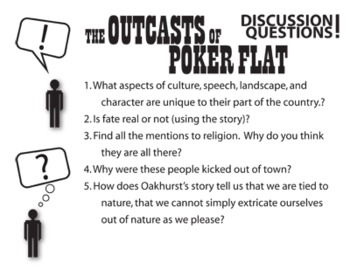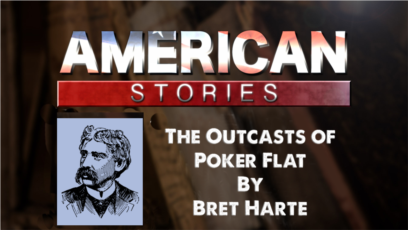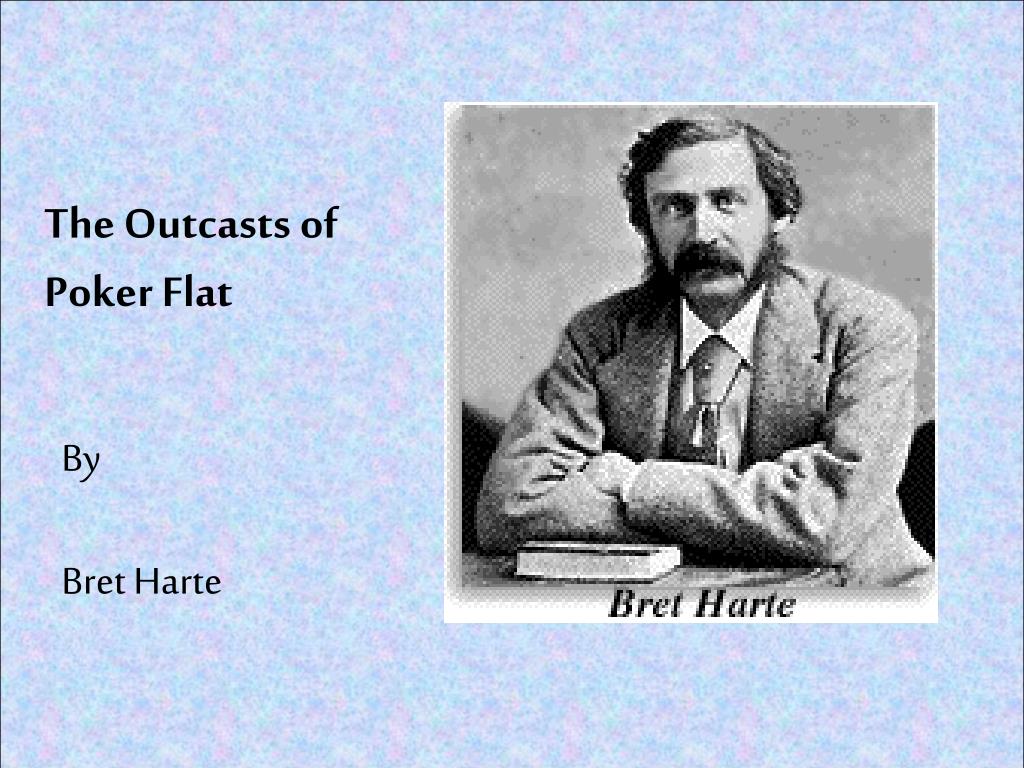The Outcasts Of Poker Flat Quiz Answers
- 1
What is the story's ultimate treatment of religion?
The story opens with John Oakhurst noticing the 'Sabbath lull in the air,' a phrase that instantly evokes Poker Flat's religious resonances. The exile of Oakhurst and his companions itself connotes divine judgement in line with the various cleansings that punctuate the Bible, including the Plagues of Egypt and the Flood, the latter of which is connoted by the narrator's comparison of the falling snow to 'white-winged doves.' Throughout the story, the narrator uses language that seems to pass divine judgement on the exiles, Tom, and Piney; for example, it describes Piney as 'the younger and purer,' and the Duchess as Piney's 'soiled sister.' However, Tom, 'the Innocent,' and his bride, Piney Woods, also initiate a round of religious hymn-singing once they have merged with the exiles, casting the entire group—including the supposedly sinful exiles—in a religious light. By the end of the story, this motif of purification has extended to include the exiles, as Mother Shipton becomes a martyr figure and the falling snow hides 'all human stain,' meaning the sin that, according to the citizens of Poker Flat, defined the exiles. In this way, the ending of the story is ultimately religious, in that it forgives the exiles of their sins in the same stroke as it eliminates them from the Earth, much like the religious cleansings of the Bible.
- 2
How does the playing card used as John Oakhurst's tombstone develop the theme of luck, chance, and fate?
Oakhurst admits that, as a gambler, he believes a person's luck is always changing, and the narrator says that for Oakhurst, life is an 'uncertain game.' Oakhurst's ideas about his profession truly extend to his worldview, which suggests a resonance between the physical playing card and Oakhurst's physical body. In this way, it is fitting that his tombstone is a playing card, as it symbolizes his ideas about knowing when one's own luck is about to run out. His suicide thus becomes a victorious act, as he ultimately wins the game of life by taking his own life instead of succumbing to death like his companions in the mountains.
- 3
How does Mother Shipton's role as a martyr develop the story's existing themes of guilt, purity, and innocence?
Mother Shipton begins the story as a sinful character but evolves into a martyr, providing a useful microcosm of the more global irony embedded in the story. Although both Mother Shipton and the Duchess have been exiled because of their profession as prostitutes, Mother Shipton is presented as a thornier, more vengeful character than The Duchess. When the journey begins, for example, Mother Shipton threatens to 'cut somebody's heart out,' whereas the Duchess directs her anger inward, simply threatening to 'die in the road.' As the characters' exile grows more desperate, however, Mother Shipton becomes the ultimate figure of selflessness, sacrificing her food—and therefore her life—so that Piney, who is clearly the most innocent of the expedition's women, may live. More so than even Oakhurst, Mother Shipton thereby enhances the irony and hypocrisy of Poker Flat banishing those whom they deem 'improper,' revealing that in doing so, they have sentenced an unsung martyr to her death.
- 4
How do the myths and mythical symbols mentioned in the story speak to the novel's themes of innocence and purity?
Notions of good and evil are crucial to this story, as its premise is the exile of those deemed 'improper' by the good townspeople of Poker Flat. Much of this duality is communicated through symbols that relate to purity and innocence or, by contrast, stain and guilt. It is, for example, in the guise of a mere plot device that snow serves as a crucial symbol of purity. This is explicitly invoked by the narrator at the close of the story when the characters succumb to the blizzard: 'all human stain, all trace of earthly travail, was hidden beneath the spotless mantle mercifully flung from above,' says the narrator. Fire likewise becomes a dual symbol of both damnation (hellfire) and purification. In this way, fire and snow serve as almost biblical—indeed elemental—symbols that track the supposedly evil group of exiles throughout their journey from 'evil' to 'good.' It is the story of the Iliad, however, that serves as the ultimate mythical symbol in the story, invoking as it does the themes of fate and divine judgement.
- 5
Is this story ultimately fatalistic?
Throughout the story, the narrator plays with the idea that life is a game of poker and therefore subject to the same odds. This is, of course, voiced explicitly by John Oakhurst, who calls life 'an uncertain game.' In a vacuum, this line would imply that one's fate is as predetermined as a deck of cards, a thesis that is likewise borne out when Oakhurst says that all one can ever know about luck is that it is 'bound to change.' That said, notions of fate and free will duel throughout the story on a character-by-character basis. Although the exiles are doomed, through no fault of their own, when Poker Flat banishes them on the eve of a blizzard (not to mention when Uncle Billy steals their provisions), Tom 'the Innocent' and his bride, Piney, choose to take the mountain pass to seek their fortune. Likewise, while most of the characters surrender to death by freezing, John Oakhurst chooses to commit suicide by shooting himself in the heart, while Mother Shipton starves herself. In this way, the story keeps in tension notions of fate and free will, as each character's fate is a product of both.
- Learn English Through Story - The Outcasts of Poker Flat by Bret Harte By: English Story channel Story title: The Outcasts of Poker Flat Author: Bret Harte T.
- The Outcasts of Poker Flat The goal of regionalists was to capture life at a particular time in history. In your opinion, how well did Harte convey the region, the people, and the times in “The Outcasts of Poker Flat”? Cite evidence to support your view.
- John Oakhurst, gambler, stepped into the main street of Poker Flat on the morning of the 23rd of November, 1850, he was conscious of a change in its moral atmosphere since the preceding night. (Bret Harte, 'The Outcasts of Poker Flat').
The Outcasts Of Poker Flat Quiz Answers Questions And Answers
Outcasts Of Poker Flat Questions
The Outcasts of Poker Flat
Outcasts Of Poker Flat Theme

Why are the outcasts trapped in the Sierras: Snowstorms prevent their leaving: Where is Mr. Oakhurst’s body discovered at the end of the story: Under the snow under the tallest pine tree: Why is Mr. Oakhurst banished from Poker Flat: He has won a great deal of money: How does Mr. Oakhurst respond to Tom Simson’s innocence: Feels protective.
We present “The Outcasts of Poker Flat” by Bret Harte. Here is Jim Tedder.
John Oakhurst was a gambler. He had lived in the small western town of Poker Flat for only a short time. He had defeated many people at cards. He had also won a lot of their money. For that reason alone, he was not well liked.
On the morning of November twenty-third, eighteen fifty, he saw some men talking as he walked down the main street of town. As he came near, they got quiet. He said to himself, “Hmmm, I guess they are talking about me. And that can’t be good.” Oakhurst was right. Some of the town’s leaders had met secretly and decided to force some people to leave. They thought Poker Flat would be a better place to live if those people were gone.
Besides Oakhurst, two women of low morals were led to the edge of town. They were the “Duchess” as she was called, and “Mother Shipton.” A man called “Uncle Billy” was added to the group. He was known to drink too much. Some people thought that he had also stolen some gold. They had no proof. But that did not matter. Uncle Billy was just no good, and he had to go. The “outcasts” were told that if they ever came back, they would be killed.

So, the four of them slowly rode out of town. The “Duchess” cried and said she would probably die on the road. Mother Shipton and Uncle Billy cursed. “Mother” said she would like to “cut the heart out” of the people who done this to them. But John Oakhurst rode in silence. He thought all of life was a gamble. He had just run into some bad luck. That was all.
The outcasts were headed for Sandy Bar, a camp not too far away. But it was high up in the cold Sierra Mountains, and the path was anything but smooth. Around noon, Mother Shipton became so tired she fell off her horse. She said that was as far as she was going today. Oakhurst tried to make them move on because they had no food or fuel. But the three would not listen. Instead they began to drink alcohol that Uncle Billy had hidden. Soon they were quiet and asleep.

Oakhurst did not drink. He stood nearby and watched them. He began to think about his life and about how lonely he was. Yet he was stronger than his three companions. He could have left them there and set off alone. But he did not.
Then, he heard someone call “John Oakhurst.” A young man named Tom Simson came riding up. The gambler knew Tom. They had once played cards and Oakhurst had won. But after the game, he told young Tom that he was too easy to beat. And he gave him back his money. Tom said Oakhurst would be his friend for life.
Tom was not alone. From behind a tree came his new wife, a girl named Piney Woods. Her father had not wanted her to marry Tom. So they had run away. Tom told Oakhurst that he had a little food. He also showed him an old log house just off the path. Years of harsh weather had nearly ruined it. But it was all they had, and it would have to do. The women could spend the night in there. The men would make a fire and sleep on the ground by the door.
The night seemed to pass quickly. But the weather became colder. The wind increased, and it began to snow. Oakhurst had a bad feeling. He turned to where Uncle Billy had slept, and found him gone. He had left the others and even taken their horses. Oakhurst said Uncle Billy had probably gone for help. But he knew better. The group of five decided to wait for the snow to stop before traveling farther. They no longer had horses. From here on, they would be on foot.
By the third day out from Poker Flat, the snow had gotten deep. They could no longer see the path. Food was running low. Everything around them was white and cold. One week later they still had not moved. The snow had continued to fall and was deeper than ever. And it continued to fall. It formed a prison they could not escape. Still, they could see smoke rising from the warm fires in the houses down below in Poker Flat. The site seemed especially cruel.
But the little group of outcasts tried to keep up their spirits. They tried to stay as warm as they could. They sat together by their own open-air fire. And Tom Simson pulled a small accordion from his pack. Piney Woods played the instrument. They all sang songs. The music took on a defiant quality, a quality of resistance. But the outcasts had to listen to the sad cries of their mostly empty stomachs. The hunger got worse with each passing day.
At midnight on the tenth day, Mother Shipton called Oakhurst to her side. She said, “Give this to the young ones.” In a bag was all her food. She had not eaten for days. She had saved the food for the others. She turned quietly to the wall of the log house, and died.
John Oakhurst began to think that none of them would live out the storm. He gave Tom Simson a pair of snowshoes and asked him to try to walk back to Poker Flat for help. He guessed it would take Tom at least two days, if not more, to get there. Tom kissed his new bride and left on foot. Soon he was out of sight. The Duchess and Piney were surprised, and frightened, when Oakhurst also turned to leave. “You’re not going, too,” they cried. He said, “Only a little way. I need to find us some help.”
At that time of year, daylight did not last long. When night came, Oakhurst had not returned. The two women were too hungry, weak, and cold to even add more wood to the fire. They passed the stormy night holding each other close. And that is the way they were found the next morning when help arrived from Poker Flat. They had frozen to death during the night.
The rescuers from town said that they had been right to force the outcasts to leave Poker Flat. But they never thought the punishment would end up like this. Justice was one thing, but freezing people to death was not their aim. And then they thought of the gambler. Where was he? What had happened to him? They searched as best they could. And then, they found him.
Under a tall tree a playing card was stuck into the wood by a knife. On the card was written: “Beneath this tree lies the body of John Oakhurst, who had some bad luck starting the twenty-third of November, eighteen fifty. He handed in his cards on the seventh of December, the same year.”
Oakhurst sat there, cold and still. They said he looked peaceful. A single bullet from a small hand gun nearby had ended his life. John Oakhurst had been both the strongest, and the weakest, of the outcasts of Poker Flat.
“The Outcasts of Poker Flat” by Bret Harte was adapted for VOA Learning English and read by Jim Tedder.
How well do you understand this story?

Quiz - The Outcasts of Poker Flat by Bret Harte
Start the Quiz to find out
For Teachers
This lesson plan has activities to use when teaching with this story.
__
______________________________________________________________
Words in This Story
gambler - n. a person who risks money or other possessions when playing a game
prison – n. a place where a person is kept as punishment for a crime
cruel - adj. causing or helping to cause suffering; terrible and unfair
outcast - n. someone who is not accepted by other people

Outcast Of Poker Flats Movie
snowshoe - n. a light, wide frame that is attached to your shoe to make it easier to walk on soft snow without sinking